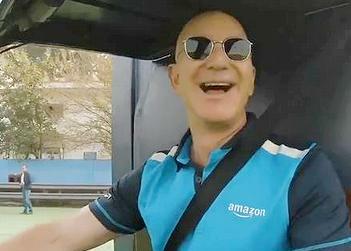
SEATTLE, Washington, November 17, 2020 (ENS) – Amazon CEO Jeff Bezos, the world’s wealthiest person, is giving nearly $800 million to 16 environmental groups in the first donations from his $10 billion Earth Fund. In February, Bezos announced the creation of his personal $10 billion Earth Fund, designed to support what Bezos has called “needle-moving solutions” to the climate crisis.
“I’ve spent the past several months learning from a group of incredibly smart people who’ve made it their life’s work to fight climate change and its impact on communities around the world,” Bezos posted on Instagram Monday announcing the grants. “I’m inspired by what they’re doing, and excited to help them scale.”

“Today,” Bezos wrote, “I’m pleased to announce the first Bezos Earth Fund recipients -16 organizations working on innovative, ambitious, and needle-moving solutions. This $791 million in donations is just the beginning of my $10 billion commitment to fund scientists, activists, NGOs, and others. We can all protect Earth’s future by taking bold action now.”
The complete list of grantees is: The Climate and Clean Energy Equity Fund, ClimateWorks Foundation, Dream Corps Green For All, Eden Reforestation Projects, Energy Foundation, Environmental Defense Fund, The Hive Fund for Climate and Gender Justice, Natural Resources Defense Council, The Nature Conservancy, NDN Collective, Rocky Mountain Institute, Salk Institute for Biological Studies, The Solutions Project, Union of Concerned Scientists, World Resources Institute, and World Wildlife Fund.
The 16 recipients include five large, well-known environmental groups that will each receive a grant of $100 million from the Bezos Earth Fund – the Environmental Defense Fund, the Natural Resources Defense Council, the Nature Conservancy, the World Resources Institute, and the World Wildlife Fund.
Grantees Focus on Nature’s Own Solutions
The Environmental Defense Fund, EDF, will use its $100 million grant “to build confidence in nature-based climate solutions that harness the power of forests, agricultural soils and oceans to capture and store carbon by using peer-reviewed science to ensure the integrity of carbon credits. So the rainforests of the world are worth more alive than dead,” the group said in a statement.
The Bezos Earth Fund gift will allow EDF to complete MethaneSAT, a satellite that will locate and measure sources of methane pollution around the world, and launch it in 2022.
Methane is the primary component of natural gas, a common fuel source, but if methane leaks into the air before being used, from a leaky pipe, for instance, or gas flaring, it absorbs the sun’s heat, becoming a greenhouse gas. In the first two decades after its release, methane is 84 times more potent than carbon dioxide. “We must address both types of emissions if we want to reduce the impact of climate change,” EDF says.

MethaneSAT will provide regular monitoring of regions accounting for more than 80 percent of global oil and gas production on a weekly basis, with enough detail to identify both location and emission rates with an unprecedented degree of precision.
Data analysis will then determine responsibility for those emissions.
The Bezos Earth Fund is also supporting the data platform and advocacy agenda that will make all MethaneSAT data transparent and publicly accessible.
EDF expects the MethaneSAT work to cut methane pollution from the global oil and gas industry 45 percent by 2025, “delivering the same 20-year benefit as closing a third of the world’s coal plants,” the group said. This will put the industry on the path of a 75 percent reduction before 2030. It’s the fastest, most cost-effective thing we can do to slow the rate of warming right now even as we continue to decarbonize the energy system.”
The Natural Resources Defense Council will use its $100 million grant from the Earth Fund to help NRDC “advance climate solutions and legislation at the state level, move the needle on policies and programs focused on reducing oil and gas production, protect and restore ecosystems that store carbon, like forests and wetlands, and accelerate sustainable and regenerative agriculture practices.”
“This generous gift from the Bezos Earth Fund enables NRDC to move even faster on achieving the climate solutions we need at the federal, state and local levels to protect people’s health, strengthen nature’s ability to help fight climate change and grow the clean energy sector and all the jobs that come with it,” said NRDC president and CEO Gina McCarthy, former administrator of the U.S. Environmental Protection Agency under President Barack Obama.
“With new resources and growing political will, NRDC, alongside partners across the country, will advance equitable climate solutions and build a brighter future for us all.”
The Nature Conservancy will use its $100 million Bezos Earth Fund grant to protect the Emerald Edge forest in the United States and Canada. In partnership with Indigenous and tribal communities whose culture and livelihoods are intertwined with the landscape, the Nature Conservancy will work to increase the forest’s ability to store carbon and mitigate emissions that damage the planet.

The Emerald Edge, which extends from Washington state to southeast Alaska, is the largest, intact temperate rainforest on Earth.
The Nature Conservancy’s Washington state director Mike Stevens said this region is critical for storing carbon – a natural solution to climate change. “Up to a third of the emissions reductions and sequestration that we need to do can be done through nature,” he said.
Part of the funds will be used to protect 250,000 acres of old-growth forest on Vancouver Island in British Columbia, which The Nature Conservancy says will conserve more than 47 million tons of standing carbon and sequester 3.5 million tons of carbon dioxide.
The grant also will support efforts to reduce the carbon footprint of farming practices in Northwest India and curtail agriculture’s contribution to Delhi’s air pollution.
Nature Conservancy CEO Jennifer Morris said, “One of the best tools we have to address the climate emergency is nature herself. With this generous gift from the Bezos Earth Fund, The Nature Conservancy and our partners around the globe will be able to expand our pioneering work developing and implementing natural climate solutions.”
Advancing natural solutions is also a priority for the World Resources Institute, which will receive $100 million over five years, enabling the institute to work with partners to scale its work and impact globally.
WRI says the organization will use this grant to develop a satellite-based monitoring system to advance “natural climate solutions” around the world. The system will monitor carbon emissions and capture potentially harmful changes to the world’s forests, grasslands, wetlands, farms, and other critical areas.
The WRI grant will also be used to spur the electrification of U.S. school buses by 2030 – over 450,000 vehicles – bringing cleaner air and fewer carbon emissions to communities across the country.
“We are grateful to the Bezos Earth Fund for this very generous gift to advance two game-changing climate initiatives at a time when they are urgently needed,” said World Resources Institute President and CEO Dr. Andrew Steer. “Building on our expertise and bringing together many partners, we will use these resources to accelerate transformative shifts in monitoring land use and carbon emissions and electrifying vehicles. These initiatives will cut emissions, create a healthier environment, spur economic opportunities, and improve the lives of millions of people in the United States and around the world.”
The power of nature to heal the climate is also central to the plans the World Wildlife Fund, WWF, is making to utilize its $100 million Earth Fund grant. WWF will use the money to “accelerate the most promising solutions that harness the power of nature to provide for communities and stabilize our climate,” the group said in a statement.
This grant will help WWF protect and restore mangroves, which store carbon and protect coastal communities from the ravages of climate-accelerated weather events. It also will enable WWF to develop new markets for seaweed as an alternative to fossil fuel-based products and to protect forests and other ecosystems from destruction in some of the most important landscapes in the world.
WWF-US President and CEO Carter Roberts said, “Our best solutions both lower global emissions and strengthen the climate resilience for people in some of the world’s most vulnerable communities. Now we have the resources to put those solutions to work across the globe.”
Smaller Bezos Earth Fund Grants Can Have a Big Impact
ClimateWorks Foundation, a global climate philanthropy platform, received a $50 million grant from the Bezos Earth Fund to support large-scale reductions in climate pollution and protect the health of people around the world. ClimateWorks will use the gift to drive climate action in the transportation and industrial sectors, which combined generate half of global greenhouse-gas emissions.
Commercial trucks, container ships, and building materials such as cement and steel generate carbon emissions that create pollution and damage human health. The Bezos Earth Fund grant will be used to help countries transition to zero-emission trucks and ships by advancing research and technological innovation and strengthening public policy support. The grant will also be used to help expand the global market for climate-safe cement and steel.
The Climate + Clean Energy Equity Fund is working with diverse communities of color leading the transition to a just and equitable clean energy future.
“The Earth Fund grant of $43 million over three years will enable us to expand our support of community-based organizations, more than doubling the number of states we are working in across the country. In turn, our grants will support grassroots organizing to build power and increase participation in our democratic processes within communities of color, advocate for clean-energy policy solutions that reflect the priorities of these communities, and advance racial, economic, and environmental justice,” the group said in a statement.
Dream Corps Green For All is a national program that works at the intersection of the environmental, economic, and racial justice movements to advance solutions to poverty and pollution. The Bezos Earth Fund $10 million grant will be used to build a more sustainable future with strong green-economy jobs and wealth-building opportunities for Black and Brown communities. It will also help provide clean economy investments in the neighborhoods that need them most.
Dream Corps Green For All, National Director Michelle Romero has big plans for their $10 million grant. “With this funding, we’ll be able to double our capacity to create a future green economy that prioritizes low-income communities and people of color across America who have historically borne the brunt of environmental pollution, but been pushed to the back of the line when it comes to benefiting from solutions,” she said.
Eden Reforestation Projects will use its $5 million Earth Fund grant to continue its work of reducing extreme poverty and restoring healthy forests in emerging economies by employing local villagers to plant millions of trees each year. Through steady employment, villagers can begin to afford daily necessities such as food, shelter, clothing, and medicine.
The Energy Foundation will receive a $30 million Earth Fund grant to advance energy efficiency and renewable energy in the power, transportation, and buildings sectors by developing innovative policies and campaigns to help propel clean energy development.

The Hive Fund for Climate and Gender Justice has been granted $43 million over three years to make grants to organizations that have historically lacked access to funding and are essential to making progress in addressing intersecting climate, gender, and racial crises in the United States. The grant will help The Hive Fund expand grantmaking to organizations led by Black, Brown, and Indigenous women and other frontline leaders.
“We support groups advocating for strong policies, building social movements to intensify public demand for change, facilitating civic engagement to build political power and hold decision-makers accountable, and conducting creative communications efforts to move hearts, minds, and imaginations,” the group says in its mission statement.
A majority of Hive funding is awarded to groups in the southern United States, where pollution levels are higher and philanthropic funding levels are lower than elsewhere in the country.
Based in Rapid City, South Dakota, the NDN Collective, an Indigenous-led organization, will receive $12 million to continue “creating sustainable solutions on Indigenous terms.” The Collective is dedicated to building Indigenous power through organizing, activism, philanthropy, grantmaking, capacity-building and narrative change.
From Boulder, Colorado, the Rocky Mountain Institute, RMI, announced that it has received a $10 million grant from the Bezos Earth Fund to help reduce greenhouse gas emissions in both U.S. buildings and in energy-intensive industrial and transport sectors.
The project will focus on making all U.S. buildings carbon-free by 2040 by advocating for all-electric new construction and retrofitting existing homes and businesses to reduce their carbon footprint.
In addition, $2 million will allow RMI and its partners to kickstart efforts via the Mission Possible Partnership, Aimed at supercharging industrial decarbonization over the next 10 years, this work will focus on scaling up high-ambition, net-zero initiatives across the energy-intensive global industries representing 30 percent of global emissions: aviation, shipping, heavy road transport, aluminum, steel, chemical and cement.
“Addressing the climate crisis can start with the places we hold most dear— the buildings where we live and work—while also decarbonizing the way we produce and transport the materials that are the foundation of those buildings, as well as the backbone of our global economy, like steel and cement.” said RMI CEO Jules Kortenhorst. “The Bezos Earth Fund commitment is an important catalyst to accelerating the impact needed to reduce GHG emissions by 50 percent by 2030.”
The Salk Institute for Biological Studies of La Jolla, California was granted $30 million from the Earth Fund. Salk’s Harnessing Plants Initiative, HPI, will use the grant to advance efforts to increase the ability of crop plants, such as corn and soybeans, to capture and store atmospheric carbon via their roots in the soil. This work will explore carbon-sequestration mechanisms in six of the world’s most prevalent crop species with the goal of increasing the plants’ carbon-storage capacity. It complements an ongoing HPI project focused on identifying genes for increased carbon sequestration in model plants and then utilizing those genes to enhance carbon sequestration in crops.
“The Bezos Earth Fund’s generous donation will help realize an exciting new HPI research program that significantly increases our scientific efforts towards the ultimate goal of utilizing crop plants to mitigate the effects of climate change,” says Salk President Professor Rusty Gage.
The Solutions Project, based in Oakland, California received a $43 million grant from the Earth Fund to accelerate the transition to 100% clean energy and equitable access to healthy air, water, and land. The Solutions Project champions and invests in a climate justice movement that supports women and power-building organizations led by Black, Indigenous, immigrant, and other people of color.
The Union of Concerned Scientists, UCS, received a two-year $15 million grant from the Earth Fund and plans to use it to “advocate for updates to the U.S. electrical grid that will dramatically speed the amount of wind, solar, and energy storage used in key states.”
The grant will also support UCS efforts to accelerate the electrification of commercial trucking, a major source of air pollution to communities along high-traffic corridors nationwide.
“We greatly appreciate this unprecedented investment in our clean energy and transportation work,” said Angela Anderson, director of the Climate and Energy Program at UCS. “We will use this funding to help accelerate the economy’s transition away from fossil fuels, in partnership with others striving for just and equitable climate solutions. As we create and expand shared strategies and alliances, we will use a significant portion of this grant to provide essential resources to grassroots and environmental justice groups.”
Amazon, the company worth over $1 trillion that Bezos founded and runs, also is investing $2 billion in the battery and e-waste recycling company led by a former Tesla executive, Redwood Materials, along with four other companies. Amazon made the commitment in June as part of efforts to slash its greenhouse gas emissions.
In September 2019, Amazon said it would cut or capture all of its planet-heating pollution for net-zero emissions by 2040, a decade earlier than the net-zero target set by the Paris Climate Accord. By 2030, Bezos says he hopes to run Amazon on renewables alone.
Copyright Environment News Service (ENS) 2020. All rights reserved.
© 2020, Environment News Service. All rights reserved. Content may be quoted only with proper attribution and a direct link to the original article. Full reproduction is prohibited.



